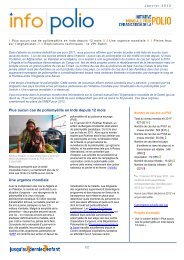(EAP) 2012-2013 - Global Polio Eradication Initiative
(EAP) 2012-2013 - Global Polio Eradication Initiative
(EAP) 2012-2013 - Global Polio Eradication Initiative
You also want an ePaper? Increase the reach of your titles
YUMPU automatically turns print PDFs into web optimized ePapers that Google loves.
6 global <strong>Polio</strong> emergency action Plan <strong>2012</strong>-13<br />
Implementation and oversight<br />
In the first three months of <strong>2012</strong>, steps were taken to<br />
reconfigure the GPEI at all levels to operate in an emergency<br />
mode. In each endemic country, the Head of State<br />
established an oversight mechanism to monitor local<br />
polio campaign performance in infected areas. This<br />
enhanced oversight was reinforced with accountability<br />
frameworks that clarified responsibility down to the<br />
district and subdistrict levels. Programme implementation<br />
at the district and subdistrict level was supported<br />
with the initial deployments of what will eventually be<br />
thousands of additional personnel through international<br />
partner agencies. The partner agencies also set up<br />
Heads of Agency oversight bodies, activated emergency<br />
1. Purpose<br />
On 21 January <strong>2012</strong>, the World Health Organization's<br />
Executive Board declared the completion of polio eradication<br />
a "programmatic emergency for global public<br />
health" 2 and requested the WHO Director-General to<br />
develop an intensified plan through <strong>2013</strong> to interrupt<br />
wild poliovirus (WPV) transmission globally.<br />
In response, the <strong>Global</strong> <strong>Polio</strong> <strong>Eradication</strong> <strong>Initiative</strong><br />
(GPEI) has developed a <strong>Global</strong> <strong>Polio</strong> Emergency Action<br />
Plan <strong>2012</strong>-13. Its goal is to support transformational<br />
change leading to eradication in the three remaining<br />
polio-endemic countries: Nigeria, Pakistan and<br />
Afghanistan.<br />
2 WHO Executive Board Resolution 130.R10 <strong>Polio</strong>myelitis:<br />
intensification of the global eradication initiative. Available at:<br />
http://apps.who.int/gb/ebwha/pdf_files/EB130/B130_DIV3-en.<br />
pdf<br />
Action to stop polio now in nigeriA, pAkistAn And AfghAnistAn<br />
operations centres and procedures, and tightened interagency<br />
programme performance monitoring.<br />
By April <strong>2012</strong>, polio cases were declining in all remaining<br />
polio-infected countries with the exception of<br />
Nigeria. The latter represents an imminent risk to west<br />
and central Africa, amplified by the cancellation of polio<br />
vaccination campaigns in 24 polio-free countries in<br />
Africa and Asia due to the shortage of funds.<br />
Progress against the <strong>Global</strong> <strong>Polio</strong> Emergency Action<br />
Plan will be tracked by the Independent Monitoring<br />
Board and reported to each session of the WHO Executive<br />
Board and the World Health Assembly.<br />
Such change will be achieved through an emergency<br />
approach that focuses on developing appropriate leadership,<br />
oversight, accountability and surge capacity at<br />
global, national and subnational levels. The emergency<br />
approach will be driven by the endemic and re-established<br />
transmission countries, with support from donors<br />
and partners.<br />
This Plan builds upon the strategic approaches outlined<br />
in the GPEI Strategic Plan 2010-<strong>2012</strong> and introduces<br />
new approaches intended to accelerate progress<br />
towards its milestones. The Plan will also serve as a<br />
critical precursor to the <strong>Polio</strong> <strong>Eradication</strong> and Endgame<br />
Strategy 2014-18.




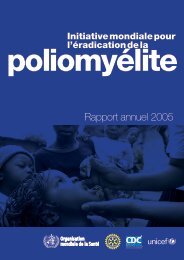
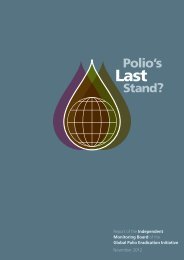
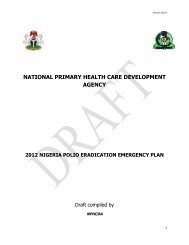
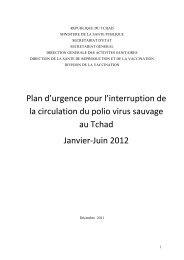
![English [pdf 2MB] - Global Polio Eradication Initiative](https://img.yumpu.com/6380394/1/190x245/english-pdf-2mb-global-polio-eradication-initiative.jpg?quality=85)
